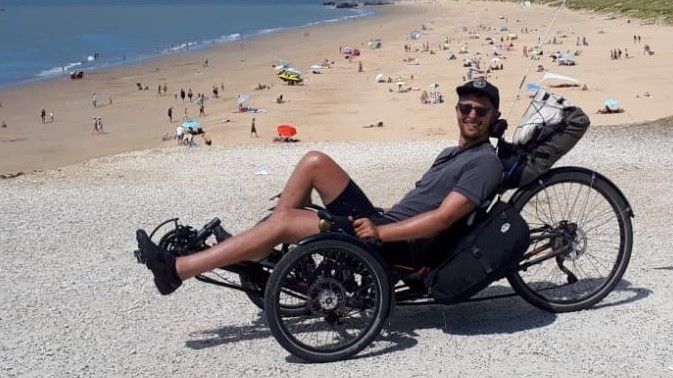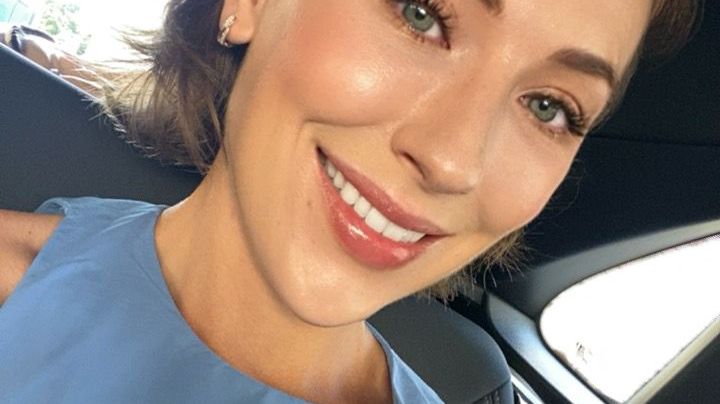
Press release -
Plymouth man who had severe stroke aged just 30 backs campaign for greater awareness of its impact on young people
A Plymouth doctor who had a severe stroke at 30 is backing a charity’s campaign to raise awareness that stroke can happen to anyone at any age.
Jimmy Hubbard’s stroke left him with a range of physical and emotional difficulties which ended his promising career as a hospital anaesthetist.
As he works to “get my life back”, Jimmy is sharing his story as research by the Stroke Association to mark World Stroke Day on Sunday 29 October reveals that over half of UK adults think strokes don’t affect young people – yet one in four happens someone of working age.
His stroke happened almost four years ago when he was working in Yeovil having just returned from living in Australia.
“I was a passionate cyclist and would regularly wake up at 5am to go cycling,” said Jimmy. “I was an over achiever.
“I was eating breakfast with a friend when I got a severe headache. This quickly progressed to double vision and numbness down the right side of my face. I was rushed to hospital by my friend and I started to lose consciousness in the car.
“We did not know I was having a stroke but as two doctors we knew something was up. I was very scared but trying to put on a brave face.
“I was taken to hospital and rushed into the scanner. I was quickly put in a coma and sent to the local neurosurgery unit. I remember very little until I woke up two days later.”
Jimmy was in hospital for five months until he was discharged when the NHS was clearing beds for covid patients.
Doctors discovered the cause of his stroke was an aneurysm, a bulging or weakened blood vessel which burst causing a bleed in the brain. He has overcome innumerable barriers through his sheer determination and persistence. He cannot use his hands, relying on lots of adaptation and machinery for tasks and admits “I just don’t do less important things.”
He’s also carved out an alternative medical career with roles at Derriford Hospital, Plymouth, and the Medical School in Plymouth.
“I am profoundly uncoordinated, this affects my ability to walk and carry out other tasks of daily life,” said Jimmy. “I have a severe tremor in my right side. I have double version for which I have had two operations and I am waiting on a third.”
Jimmy has also been left with dysarthria, a weakening of the muscles in the head and neck which make his speech slow and slurred, and he has swallowing problems.
“I find it disheartening and very frustrating when people make assumptions about my intellect because of this. It is sometimes easier to let those assumptions go uncorrected. I give up most of the time.
“I find it most commonly when meeting new people. I feel it takes time to prove myself and sometimes there is not the time. For example, speaking on the phone or speaking to check out people in shops.
“I see myself as lucky that I am cognitively intact yet this is not the assumption that most people have when looking and listening to me. In short please be kind, inquisitive and try not to be presumptuous.
“My life has changed immeasurably. As for work I no longer practice as an anaesthetist but I have managed to secure two jobs, one in teaching and one in research.”
In the early stages of his recovery, Jimmy moved back to Plymouth to stayed with his mum Sally and dad Keith but is now able to live independently in the city.
“The stroke not only took away my physical ability to perform my work and my hobbies but it also severely impacted my confidence especially with walking and socialising.
“Emotionally, I do feel low at times and my mental health has suffered. However, what drives me is the endless pursuit of improvement in every aspect of my life.
“Hobbies wise, I was a very keen road cyclist and I have recently got into recumbent bikes and have started competing.”
This summer Jimmy completed a journey of 1,000 miles from Roscoff, Northern France, to Santander in Spain, on an ICE trike, a recumbent cycle suited to his disabilities.
“I would like a people to understand that young people have strokes too, and appreciate the effort that it takes to get their life back. I would also like to stress that all strokes are different.
“My dreams are to become a consultant at something, to become competitive on my bike, to find a partner and start a family and to be a better friend than I am now.”
The Stroke Association survey showed that over half of stroke survivors said their stroke had negatively impacted their careers, and stopped them getting a job, being promoted or changing career.
Almost two thirds of stroke survivors said they are living with depression or anxiety.
Jackie Cuthbert, the charity’s associate director for the South West and the Channel Islands, said: “Our research highlights that people still think stroke is a condition that only affects older people. It’s crucial that we challenge this misconception and make people aware that stroke affects younger adults too.
“After a stroke, life changes in a flash. Two thirds of people who survive a stroke find themselves living with a disability. As a result, young stroke survivors are having important milestones and their planned futures stolen from them, while they have to learn to adapt to their new life affected by stroke.
“If you know a stroke survivor of any age, visit stroke.org.uk/worldstrokeday to find out more about support available.”
Topics
Categories
- Stroke strikes every five minutes in the UK and it changes lives in an instant.
- The Stroke Association is a charity working across the UK to support people to rebuild their lives after stroke. We believe that everyone deserves to live the best life they can after stroke. From local support services and groups, to online information and support, anyone affected by stroke can visit stroke.org.uk or call our dedicated Stroke Helpline on 0303 3033 100 to find out about support available locally.
- Our specialist support, research and campaigning are only possible with the courage and determination of the stroke community and the generosity of our supporters. With more donations and support, we can help rebuild even more lives.
- You can follow us on Twitter, Facebook and Instagram.



